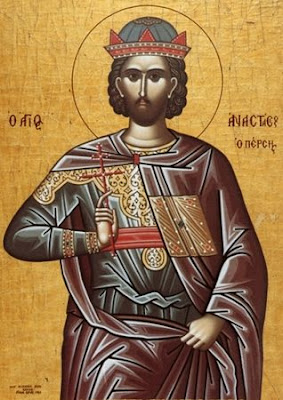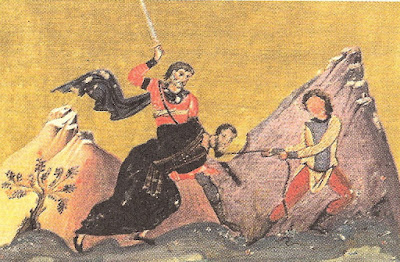 |
| St. Anastasios the Persian (Feast Day - January 22) |
Verses
Anastasios is strangled by the throat,
The cord becoming beautified with brilliance.
On the twenty-second Anastasios underwent strangling.
Anastasios, the glorious Martyr of Christ, was from Persia, and lived at the time when the Persian King was Chosroes II (590-628), and the Roman Emperor was Heraclius (610-641). Anastasios' Persian name before Baptism was Magundat, the son of a magi named Vav, and from him he thoroughly learned the magical arts. He then entered into military service at the time when the Persians invaded Palestine, where they sacked the holy city of Jerusalem, and took many of its inhabitants as slaves. Among those held in bondage was the Honorable and Life-Giving Cross, on which our Lord endured His Passion, and they took it to Persia. While in the hands of the Persians, the Honorable Cross worked many miracles, causing many to say that the God of the Christians had come to Persia.
While at the garrison of Seleucia-Ctesiphon, Magundat was moved by the grace of God which he witnessed through the Honorable Cross, and fervently sought to learn more about Christ. Wherefore he came across a Christian who taught him all about the economy of the Cross, which caused him to believe in Christ. For this reason, after embarking on a military campaign to Chalcedon, where he learned of the victory of Heraclius over the Persians, he left his military service and went to Hierapolis in Syria, where he lodged with a Persian goldsmith who was a Christian, and there he worked as a goldsmith. He requested to be baptized, but the goldsmith hesitated for fear of retribution, so Magundat went alone to pray in a nearby church. There he saw scenes of the Martyrs depicted on the walls, and experienced an ardent desire of finding the same perfection for himself by shedding his blood for Christ. From there he withdrew to Jerusalem, where he received Holy Baptism from Patriarch Modestos of Jerusalem (Dec. 16), and was given the name Anastasios. He then became a monk in the Monastery of Saint Anastasios near Jerusalem whose Abbot was named Justin, and where monks from the Lavra of Saint Savvas had taken refuge.
In the monastery Anastasios made rapid progress not only in asceticism and the acquisition of the virtues, but also in the Greek language and in the memorization of the Psalter. By memorizing the Psalter he was inflamed in his heart more and more to long for the Lord, and the desire to end his life in martyrdom. After he received monastic tonsure he labored for seven years to purify his heart, and served the brethren as a cook and gardner, never being absent from the church services, and listening attentively to the lives of the Saints and Holy Martyrs, whom he desired to emulate.
Shortly thereafter the thrice-blessed one beheld a vision. In the vision he ascended a lofty mountain that seemed to be suspended in the air. When he reached the top a man gave him a gold cup that was adorned with precious stones and full of wine. The man told him to drink the wine, so Anastasios drank, finding it to be exceedingly delicious, causing him to have a feeling of sweetness in his soul. Immediately Anastasios understood that the Lord was inviting him to Himself by way of his desire for martyrdom, perceiving the cup to be death, of which he would soon partake. Therefore he confided this matter to his spiritual father, and after partaking of the Holy Mysteries he secretly departed the monastery.
After visiting various holy shrines he came to Caesarea, the seat of the Persian authorities, and confronted a Persian magician, rebuking and censuring him for practicing the illicit art he once practiced, and told him about his conversion to Christ. When certain Persian soldiers overheard Anastasios trying to convert the magician, he was arrested and brought before the governor Marzavanes. Confessing before him that he was a Christian, Anastasios was unmoved by his threats, therefore he was condemned to hard labor by carrying stones for the building of a fortress. Many of Anastasios' acquaintances and compatriots were there, and they questioned him why he spurned their beliefs, reproaching him, beating him, and tearing at his beard and clothes.
Anastasios was again brought before the governor, who threatened to send him to be cruelly punished by the King if he did not deny Christ, but Anastasios remained firm and unmoved, and was cruelly beaten and thrown again into the dungeon. A few days later the governor told Anastasios to offer a sacrifice to the fire, as was the Persian custom, to which Anastasios affirmed the foolishness of worshiping fire or anything else created. Again Anastasios was brought to prison. During this time his spiritual father, the Abbot Justin, heard of what he was enduring for the Christian faith, so he sent by means of two other monks a letter of encouragement to Anastasios to endure his conflict courageously to the end just as he began.
In prison he was bound to a felon in an adjoining cell with a chain by the neck and feet, but this did not prevent him from reciting his daily prayer rule. When the felon decided to take a peek at his fellow prisoner to whom he was bound, he saw in his cell men in white garments who shone as brilliantly as the sun, and Anastasios himself enveloped in a divine light, while a man resembling a deacon was censing him. In utter amazement, he told his fellow prisoners to see what he had seen, but when they looked they were unable to see anything.
The next day the governor sent a message to Anastasios, indicating that he had written to the King about his case, and the King allowed Anastasios the option of returning to his military service or becoming a monk and remaining a Christian, as long as he uttered with his mouth that he abjured Christ, while in his heart he could believe whatever he wished. Such a proposal fell on deaf ears, since Anastasios did not want to even appear to deny Christ in any way. In response to this, Anastasios was bound with two other Christian prisoners to be brought to the King, and he was followed by one of the monks from his monastery (who later became his biographer). While in prison awaiting deportment he and the other Christians prayed all night. Then, a controller of the customs requested of the governor that Anastasios and his two fellow prisoners be allowed to attend a church service for the feast of the Exaltation of the Honorable Cross, and permission was granted. When Anastasios entered the church, he was reverenced as a Martyr, and the faithful venerated his wounds. This further inflamed his zeal for martyrdom. The customs controller then asked for the blessing of allowing to give the prisoners hospitality in his home, to which they accepted. After this they returned rejoicing to prison.
Then Anastasios and his fellow prisoners were brought to King Chosroes in Bethsaloe of Assyria, near the Euphrates River, and cast into prison. A few days later he was interrogated by an officer, but seeing that he refused to ever speak in the Persian language again and only Greek, an interpreter was brought in. After being threatened and flattered, Anastasios remained firm in his faith. Then Anastasios was cruelly beaten with wooden clubs over the course of three days. Later the King ordered for him to be stretched out on his back with a heavy beam laid across his thighs and the weight of two men pressing down him, crushing his bones. This caused great distress to Anastasios, but he bravely endured.
Because the jailer was a Christian, many Christians were allowed access to Anastasios and venerated his wounds and attended to him, but this brought sorrow to Anastasios who did not seek the praise of men. Later the King continued to torture Anastasios by having him hung by one hand while a heavy stone was tied to his leg. This trial lasted for two hours. Because he bravely endured this torment as well, the King ordered that Anastasios and his fellow prisoners be put to death. Therefore, seventy Christian prisoners were removed form their cells and marched to the river bank. There all the prisoners were strangled to death before Anastasios. When his turn came Anastasios felt sorry that he could not endure a more painful death for the love of Christ. Thus he too was strangled on the 22nd of January 628, and he was beheaded in order for the executioners to show the King that he indeed was killed.
The monk who had accompanied him acquired his body and buried it some distance away in the Monastery of Saint Sergios, later known as Sergiopolis; and he brought his tunic back to Palestine where it worked many miracles. His holy relics were later translated to Palestine and Rome and Constantinople, where Empress Irene dedicated a church to Saint Anastasios. The translation of his holy relics is celebrated on January 24th.
Apolytikion in the First Tone
O wise Anastasios, glory of martyrs, boast of the venerable ones and treasure of Persia, helper of the faithful and herald of our Faith; we praise thee with angelic hymns whilst crying: Glory to Him Who has strengthened thee; glory to Him Who has crowned thee; glory to Him Who through thee works healings for all.
Kontakion in the First Tone
Let us the faithful praise Timothy the divine disciple and fellow-traveller of Paul. And with him let us honour Anastasios who shone like a star from Persia, and who drives away the passions of our souls and the diseases of our bodies.
